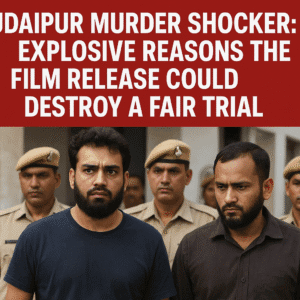Udaipur Murder Shocker: 7 Explosive Reasons the Film Release Could Destroy a Fair Trial
An accused in the 2022 Kanhaiya Lal murder case has urgently petitioned India’s Supreme Court to halt the release of “The Udaipur Files,” a film based on the crime scheduled for July 11th. Mohammed Javed argues the film’s depiction of events and portrayal of the accused as definitively guilty will severely prejudice his right to a fair trial, undermining the fundamental legal presumption of innocence protected under Article 21 of the Constitution. He contends the film’s communally provocative narrative and timing, while legal proceedings are ongoing, risk improperly influencing public opinion and potentially tainting the judicial process. The case centers on the brutal murder of the Udaipur tailor, investigated by the NIA under serious charges.
The Supreme Court now faces the critical task of balancing the filmmakers’ freedom of expression against the accused’s fundamental right to an unprejudiced trial. This legal challenge highlights the recurring tension between powerful media narratives and the integrity of active court proceedings. The Court’s decision will set a significant precedent on protecting fair trials amidst sensationalized portrayals of sub-judice cases.

Udaipur Murder Shocker: 7 Explosive Reasons the Film Release Could Destroy a Fair Trial
The Supreme Court faces a critical test balancing freedom of expression against the fundamental right to a fair trial, as Mohammed Javed, an accused in the 2022 murder of Udaipur tailor Kanhaiya Lal Teli, petitions to halt the release of the film “The Udaipur Files: Kanhaiyalal Tailor Murder.” Scheduled for release this Friday (July 11, 2025), the film has become the center of a legal storm.
Javed, identified as the 8th accused in the high-profile case, filed a writ petition urgently arguing that the film’s imminent release poses a grave threat to the ongoing judicial process. His core contention is stark: “Releasing such a movie at this juncture, portraying the accused as guilty and the story as conclusively true, has the potential to seriously prejudice the ongoing proceedings.”
The Heart of the Legal Challenge
Javed’s petition raises profound constitutional and legal concerns:
- Presumption of Innocence Undermined: He argues the film, by depicting the events and accused as definitively guilty, directly attacks the bedrock legal principle that an accused is presumed innocent until proven guilty in a court of law. The cinematic portrayal, he contends, will irrevocably shape public perception against him and his co-accused.
- Prejudicing Public Opinion & Potential Jurors: The petition explicitly highlights that the film’s wide release is “likely to influence public opinion in a manner that could affect the fairness of the trial.” In a society saturated by media, this raises the specter of tainting potential jury pools (if applicable) or creating a hostile environment that could pressure witnesses or even judges.
- Article 21 at Stake: Javed grounds his plea in Article 21 of the Indian Constitution, guaranteeing the right to life and personal liberty, interpreted by courts to include the right to a free and fair trial. He asserts that allowing the film to release now would be a direct violation of this fundamental right: “This directly impacts the right to a free and fair trial of the Petitioner.”
Context: A Brutal Crime and Sensitive Proceedings
The petition stems from the horrific June 2022 murder of Kanhaiya Lal Teli in Udaipur, Rajasthan. Teli was brutally killed, allegedly by Mohammad Riyaz and Mohammad Ghous. The National Investigation Agency (NIA) took over the probe, invoking stringent charges under the Unlawful Activities (Prevention) Act (UAPA) and the Indian Penal Code (IPC) against multiple accused, including Javed. The case, involving communal tensions and terrorism allegations, remains highly sensitive and sub judice.
The Film’s Controversy: Art vs. Justice?
While details of the film’s exact narrative are not fully public from the petition, Javed labels it as “communally provocative.” His legal team argues that presenting a dramatized version of events before the court has reached its own conclusion is inherently dangerous. The timing, just before the trial potentially reaches critical phases, is seen as particularly problematic.
What the Supreme Court Must Weigh
The apex court now faces a complex dilemma:
- Free Speech vs. Fair Trial: Does the right to creative expression and public discourse (potentially including films based on real events) outweigh the right of an accused to an unprejudiced trial?
- Sub Judice Contempt: Could the film amount to trial by media, potentially interfering with the administration of justice?
- Precedent: Past rulings, like the Sahara vs. SEBI case, acknowledge that excessive media publicity can prejudice trials, allowing courts to impose restrictions.
- Public Interest: While the public has an interest in the case and freedom of information, there’s also a paramount public interest in ensuring justice is delivered fairly and seen to be delivered fairly.
Potential Outcomes and Significance
The Supreme Court could:
- Grant a Stay: Temporarily halting the release until the trial concludes or specific safeguards are implemented.
- Order Disclaimers: Mandating prominent disclaimers emphasizing the accused’s presumption of innocence and the film being a dramatization, not a court record.
- Deny the Stay: Finding insufficient evidence of imminent prejudice or prioritizing free expression.
- Fast-Track Hearings: Expediting the trial itself to mitigate the potential long-term impact of the film.
Beyond the immediate legal battle, this case underscores a recurring tension in the digital age: How does society navigate the powerful influence of mass media narratives when they intersect with active, sensitive judicial processes? The Supreme Court’s decision will not only impact the fate of “The Udaipur Files” but will also set a significant precedent on protecting the sanctity of criminal trials amidst the pervasive reach of popular culture. The core question remains: Can justice be truly blind when a high-profile film potentially declares guilt before the gavel falls?
You must be logged in to post a comment.